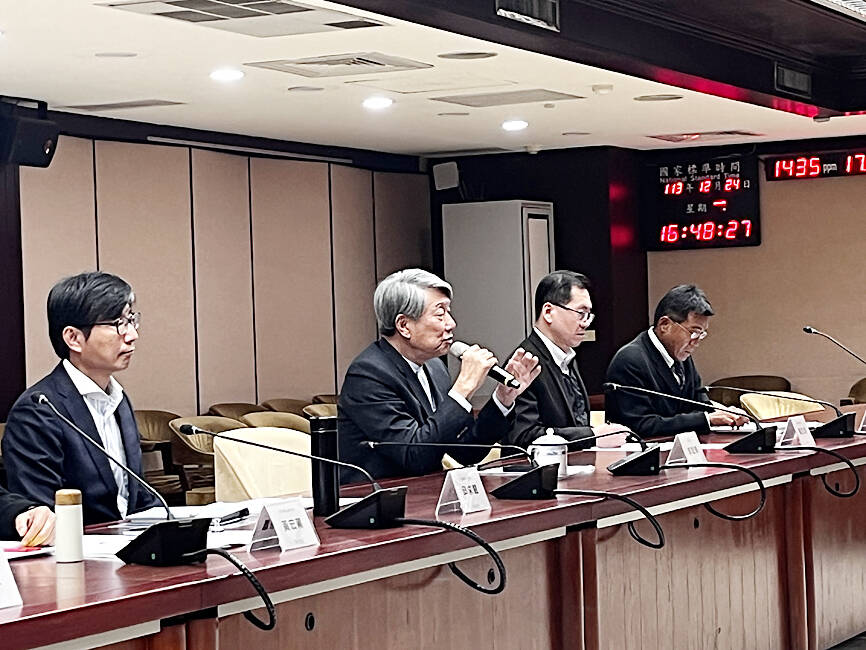The amendments to a budget law could undercut Taiwan’s artificial intelligence (AI) and technology development projects with global tech giants, the Ministry of Economic Affairs said yesterday.
After the amendments to the Act Governing the Allocation of Government Revenues and Expenditures (財政收支劃分法) passed the legislature on Friday, the ministry expects a budget deficit of NT$30 billion (US$918.3 million), including NT$11.6 billion in technology research subsidies, Minister of Economic Affairs J.W. Kuo (郭智輝) told a media briefing.
That would affect the ministry’s collaboration with the world’s major semiconductor companies, including Nvidia Corp, Advanced Micro Devices Inc (AMD), Micron Technology Inc, ASML Holding NV, Lam Research Corp and Synopsys Inc to bring new technologies to Taiwan, Kuo said.

Photo: Liao Chia-ning, Taipei Times
Micron plans to produce high-bandwidth memory chips at its Taiwan site, while Nvidia and AMD would set up new research and development (R&D) centers in the nation, Department of Industrial Technology Director-General Chiou Chyou-huey (邱求慧) said.
Such collaborations are essential parts of AI development in Taiwan, he said.
Those projects rely on years of research and technology deployment, and a lack of government budget could delay their progress, Chiou said.
The ministry has granted Nvidia NT$6.7 billion in subsidies for its AI innovation center in Taiwan from 2022 to 2027, while AMD is to receive NT$3.31 billion in subsidies for its new R&D center, the ministry said.
Nvidia and AMD are major customers of Taiwan Semiconductor Manufacturing Co (台積電), while Lam Research and ASML are key equipment suppliers to it.
Taiwan could risk damaging its reputation and losing its appeal to foreign investors if it cannot honor the contracts signed with foreign firms, Chiou said.
The ministry said that its efforts to support an F16 jet maintenance center, a space industry development program, and 6G industry and talent cultivation programs could be affected negatively.
The new government fund allocation rules would lead to allocation of NT$10 billion for a public construction budget and NT$7.44 billion in general spending, it said.
To cope with budget cuts, local governments should shoulder the responsibility of building flood prevention systems, water supply systems spanning administrative regions, as the ministry can no longer afford those expenses, it said.
Micro, small and medium-sized businesses would also face a lack of subsidies, it added.

When an apartment comes up for rent in Germany’s big cities, hundreds of prospective tenants often queue down the street to view it, but the acute shortage of affordable housing is getting scant attention ahead of today’s snap general election. “Housing is one of the main problems for people, but nobody talks about it, nobody takes it seriously,” said Andreas Ibel, president of Build Europe, an association representing housing developers. Migration and the sluggish economy top the list of voters’ concerns, but analysts say housing policy fails to break through as returns on investment take time to register, making the

‘SILVER LINING’: Although the news caused TSMC to fall on the local market, an analyst said that as tariffs are not set to go into effect until April, there is still time for negotiations US President Donald Trump on Tuesday said that he would likely impose tariffs on semiconductor, automobile and pharmaceutical imports of about 25 percent, with an announcement coming as soon as April 2 in a move that would represent a dramatic widening of the US leader’s trade war. “I probably will tell you that on April 2, but it’ll be in the neighborhood of 25 percent,” Trump told reporters at his Mar-a-Lago club when asked about his plan for auto tariffs. Asked about similar levies on pharmaceutical drugs and semiconductors, the president said that “it’ll be 25 percent and higher, and it’ll

CHIP BOOM: Revenue for the semiconductor industry is set to reach US$1 trillion by 2032, opening up opportunities for the chip pacakging and testing company, it said ASE Technology Holding Co (日月光投控), the world’s largest provider of outsourced semiconductor assembly and test (OSAT) services, yesterday launched a new advanced manufacturing facility in Penang, Malaysia, aiming to meet growing demand for emerging technologies such as generative artificial intelligence (AI) applications. The US$300 million facility is a critical step in expanding ASE’s global footprint, offering an alternative for customers from the US, Europe, Japan, South Korea and China to assemble and test chips outside of Taiwan amid efforts to diversify supply chains. The plant, the company’s fifth in Malaysia, is part of a strategic expansion plan that would more than triple

Taiwanese artificial intelligence (AI) server makers are expected to make major investments in Texas in May after US President Donald Trump’s first 100 days in office and amid his rising tariff threats, Taiwan Electrical and Electronic Manufacturers’ Association (TEEMA, 台灣電子電機公會) chairman Richard Lee (李詩欽) said yesterday. The association led a delegation of seven AI server manufacturers to Washington, as well as the US states of California, Texas and New Mexico, to discuss land and tax issues, as Taiwanese firms speed up their production plans in the US with many of them seeing Texas as their top option for investment, Lee said. The